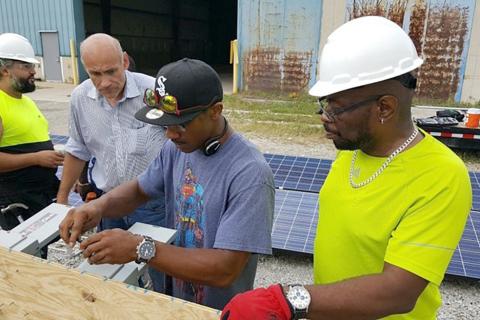NIEHS Program Lauded for Environmental Justice Efforts

Photo: OAI, INC
NIEHS’s Environmental Career Worker Training Program (ECWTP) was selected by the White House to participate in its new Justice40 Initiative, an effort to promote economic opportunity in underserved communities while advancing environmental justice.
The initiative aims to deliver 40 percent of the benefits of federal investments in climate change, clean energy, clean transportation, affordable housing, water infrastructure, workforce development and pollution remediation to disadvantaged neighborhoods.
For nearly three decades, ECWTP has helped people who are unemployed, underemployed, homeless and formerly incarcerated find jobs and become productive members of society. Individuals obtain careers in environmental cleanup, construction, hazardous waste removal and emergency response.
To date, more than 13,500 people have been trained by ECWTP grant recipients, which include community colleges, historically Black colleges and universities and apprenticeship programs, among others.
ECWTP has maintained a high job placement rate of 70 percent and is funded through the Department of the Interior, environment, and related agencies appropriations for NIEHS Superfund-related activities.
“I am proud that ECWTP was selected to participate in the new Justice40 Initiative,” said NIEHS Worker Training Program director Sharon Beard, who helped to launch ECWTP in the 1990s.
“For the last 27 years, our grantees have done an amazing job at providing hands-on worker training and career opportunities in underserved areas. These efforts give individuals the skills they need to create a better life for themselves and their families and this strengthens the communities where participants live and work.”

Photo: Steve McCaw/NIEHS
A 2015 economic impact report showed that between 1995 and 2013, ECWTP generated $1.79 billion in value to communities across the country, or about $100 million each year. Given that the program received $3.5 million in federal funding annually, the return on investment is a significant accomplishment.
Beyond the economic benefits are stories of inspiration.
“I am a bricklayer,” said one ECWTP graduate who joined the program as a single mother. “I make a difference. If it wasn’t for the training at ECWTP and effort put in by all of the training coordinators, I wouldn’t be where I’ve always wanted to be today. I don’t have a job—instead I have a career. I can say I’m certified and experienced to go on a job site and do what I was trained to do. I know safety hazards—chemicals, slips, trips, falls, confined spaces, oxygen levels, air hazards—[as well as] how to lay the perfect brick and how to carry myself as a tradeswoman.”
